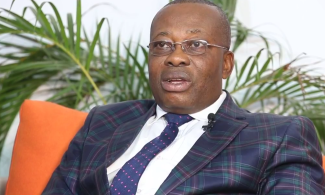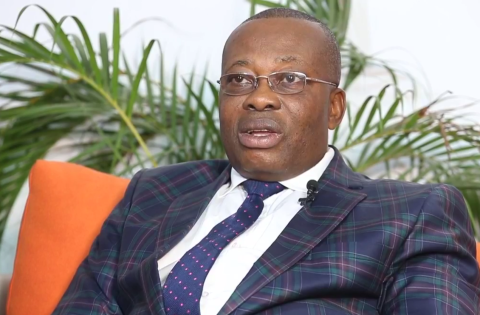
The minister said the Lagos State Government, which set up the judicial panel, lacks the power to probe the conduct of police and military officers.
The former 2nd Vice-President of Nigerian Bar Association (NBA), Monday Ubani has berated Festus Keyamo, Minister of State for Labour and Employment, for saying the Lagos Judicial Panel on Police Brutality was “illegal and a waste of time”.
Keyamo had made the comment on Sunday during an interview on Channels Television.
The minister said the Lagos State Government, which set up the judicial panel, lacks the power to probe the conduct of police and military officers.
Keyamo said by the virtue of the 1999 Constitution (as amended), only the Nigerian government can investigate the military and police.
Reacting, Ubani who is the Chairman of the Nigerian Bar Association Section on Public Interest and Development Law said the minister “erred gravely in law and logic”.

He said by virtue of Section 1 of the Tribunal of Inquiry Laws of various states, governors are vested with the power to constitute a Tribunal of Inquiry to inter alia inquire into the conduct of officers or of any officer or of any government department and related issues.
The lawyer said, “It is pertinent to state that, the authority to inquire – designated to the said Tribunal by virtue of the above-mentioned Section is disjunctive and not conjunctive. The implication is that the Tribunal set up by virtue of this Law has the authority to inquire into any (either one, several or all)
“It remains an undisputed fact that the investigation of Police brutality is designed ‘to promote the welfare of the people’. Indeed, the majority of the allegations of Police brutality pertain to extrajudicial killing or murder, attempted murder, false imprisonment and assault occasioning harm which offences are created and penalised under the Criminal Code or Penal Code are applicable in Southern and Northern States respectively.
“To that extent, Governors of States across Nigeria have the power to cause these complaints to be investigated with a view to preventing Police brutality in all its ramifications within their States. Regrettably, in spite of the several decisions of the Supreme Court on the constitutional powers of State Governments over law and order including crime control, many persons have continued to believe that State Governments are appendages of the Federal Government as was the case under the defunct Military junta.
“Unfortunately, the powers of Governors to institute Judicial Commissions of Inquiry to probe Police brutality has generated a needless controversy. With respect, tribunal of inquiry is not one of the items in the Exclusive List or the Concurrent List to the Constitution. Therefore, it is a residual matter within the legislative competence of state governments.
“This was the bone of contention in the celebrated case of Fawehinmi v. Babangida (2003) 3 NWLR (Pt. 808) 604 where the Supreme Court held that: When it is remembered that the 1999 Constitution has made no provision for Tribunals of Inquiry as did the 1963 Constitution in Item 39 of the Exclusive list and Item 25 of the Concurrent List, it follows that, to repeat myself on the point, the power to make a general Law for the establishment and regulation of Tribunals of inquiry in the form of the Tribunals of Inquiry Act 1966 is now a residual power under the 1999 Constitution belonging to the States. However, in regard to the Federal Capital Territory Abuja, the power resides in the National Assembly.
“It has also been contended that the Judicial Panels lack the vires to summon Police officers who are in the public service of the Federal Government. In Fawehinmi v Babangida (SUPRA), the Supreme Court dismissed such spurious contention. Speaking for the apex court, Uwaifo JSC (as he then was) asserted that ‘Sections 5 (c), 10 and 11(3) of the Tribunals of Inquiry Act, to compel the attendance of witnesses and the production of documents were constitutional and valid’.
“In view of the categorical pronouncement of the Supreme Court on the validity of Section 5 (c) of the Tribunal of Inquiry Act and the provision of Section 1 and 5 (c) of the Tribunal of Inquiry Law of the various States, it is submitted that the power of all State Governments to set up Judicial Commissions of Inquiry to probe human rights abuse arising from police brutality is well-grounded in law.
“In the same vein, the power of the Judicial Commission to summon police and military personnel as well as other officers in the public service of the federal government to testify in respect of allegations of human rights abuse cannot be questioned on solid legal grounds. Indeed, it is in the interest of all persons accused of violating the human rights of citizens to defend themselves in the exercise of their fundamental right to fair hearing guaranteed by section 36 (1) of the 1999 Constitution (as Amended).
“So many Panels have been set up known to us in history in Plateau, Rivers and many other States of the Federation and Police and the Army were invited and they testified in them all. So what is Keyamo SAN talking about?
“The point must be re-emphasized that investigation of abuse of rights does not fall outside the powers of constitutive State Governments of Nigeria and should not be an issue at all. Even though the involvement of a Federal Government Agency (the Nigeria Police Force) gives rise to some concerns; a cursory look at the articulate provisions of Section 5 (c) of the Tribunals of Inquiry Law, Laws of Lagos State 2015 and the combined reading of Section 1 of the said Law is enough to dismiss every iota of doubt. In providing for the powers of the Tribunals, it states as follows: Subject to the provisions of this Act, a tribunal shall have and may exercise any of the following powers: to summon any person in Nigeria to attend any meeting of the Tribunal to give evidence or produce any document or other thing in the person’s possession.
“In the same vein, the Tribunals of Inquiry Act provides under its Section 5 (c) thus: the power to summon any person in Nigeria to attend any meeting of the tribunal to give evidence or produce any document or other thing in his possession and to examine him as a witness or require him to produce any document or other thing in his possession, subject to all just exceptions.
“With these provisions, the Governor can under the cumulative interpretation of Sections 15 and 21 of the Tribunals of Inquiry Law enforce remedies which are within the jurisdiction of the State High Courts which are majorly reparations (compensations) for the victims in form of a judgement entered against the erring party – being the Commissioner of Police of the particular State in his or her official capacity.”
“Moreover with anticipated generous goodwill of the Federal Government, I do not know whether that goodwill still does exist in the light of the outbursts of Lai Mohammed and Festus Keyamo (SAN), both agents of the Federal Government (recall that it was the National Economic Council Resolutions of the Federal Government that led to the setting up of the States' Panels in the first place). Hence, it is my view that the Federal Government should accept the recommendations and resolutions of the various Tribunals of Inquiry for use in Policy formulation – to ensure that the bane of human rights violations by the Nigerian Police Force can no longer thrive.”